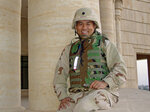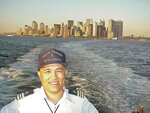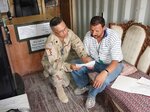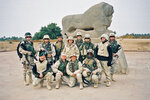




SAN DIEGO: CA
I was sent as a NAMB-endorsed military chaplain by my command, USCG Training Center Petaluma, from Northern California to New York City on September 25, 2001, to assist First Responders and help hurting Americans.
The site, smell, and sound of rescue machines were utterly devastating. I saw unimaginable destruction. Remains found cremated. Rescuers covered with dust still frantically looking and fruitlessly hoping to find surviving individuals in the rubble.
When I arrived at Ground Zero, one of the ministry outreach initiatives I proposed to our CERT – Chaplain Emergency Response Team – of U.S. Navy chaplains serving with the U.S. Coast Guard was escorting the victims’ families to Ground Zero.
When the family members and friends of crewmembers from United Airlines and American Airlines arrived at the scene, they saw the horrible sight, smell, and sounds of machines. They wept bitterly and publicly. Some wailed, “Why, why, why?”
In a fit of anger, one man pointed his blame at New York Mayor Rudy Giuliani. I observed how Giuliani responded to the angry father. He was so tactful and loving in responding to the grieving person. I also remember an 8-year-old boy standing beside me, crying and repeatedly saying, “Why did they have to kill my daddy?” I tried to comfort the young man and many other primary next of kin.
The visit to the site of the first 50 family members was like leading 50 funerals for 9/11 victims in one hour. It was the most difficult day in my entire two weeks of ministry, from September to October 2001, in New York City. In ministering to the distressed people in a disaster area in New York, I used many encouraging Bible verses, especially Psalm 46:1. “God is our refuge and strength, always ready to help in times of trouble.”
When I went to New York City, I served at Ground Zero. Three years later, I served at Building Zero in Baghdad, Iraq.
Serving in a combat zone was scary. It was a daily frightening experience. At around five each morning, insurgents would drop Chinese-made Type 63 towed 107mm Multiple Launch rockets and mortars near our living quarters. In the six months I was in the desert, I lost three of my neighbors, including the highest-ranking government civilian employee. I also saw multiple casualties from direct hits of the rockets.
One man I served with at Camp Victory was inside the shower trailer when rockets hit at 5 a.m. Another time, an injured soldier saw me and grinned. “Thank God! It was not my time. God is good!” I used the Word of God, especially Psalm 91, during my ministry time in Iraq.
The impact of our ministry during the Operation Iraqi Freedom-2 was (and is) greatly appreciated not only by many American and Coalition service members but by the thousands of Iraqis and third-country nationals we worked with and reached out to in Baghdad, Iraq, including Thair Behnan. I got him, his wife, and his seriously ill daughter to a life-saving operation in Indiana and safety in America.
This involved traveling through sniper-infested roads, including Route Irish, “the world's most dangerous road,” a 7.5-mile stretch from Camp Victory to Baghdad's Green Zone, from Camp Victory to the Green Zone, and to/from Iraqi government offices and the U.S. Embassy.
The terrorist attacks on September 11, 2001, were diabolical actions and needless man-made disasters. According to Britannica, “the official death toll, after numerous revisions and not including the 19 terrorists, was set at 2,977 people. At the World Trade Center in New York City, 2,753 people died, of whom 343 were firefighters. The death toll at the Pentagon near Washington, D.C., was 184, and 40 individuals died outside Shanksville, Pennsylvania.”
War is a man-made disaster; sadly, most war victims are civilians. The Defense Department estimates 48,000 Afghan civilians were killed and at least 75,000 injured between 2001 and 2021, though the agency acknowledges the true toll is likely significantly higher. The total cost of war in civilian lives is impossible to pin down.
And our military personnel? According to the U.S. Department of Defense Casualty Analysis System casualty website, as of July 19, 2021, there were 4,431 total deaths (including both killed in action and non-hostile) and 31,994 wounded in action during the Iraq war’s Operation Iraqi Freedom (OIF) and Operation Enduring Freedom (OEF).
The depressing effects of the war in the Persian Gulf and Middle East continue to impact service members’ families. Since 2001, I have consoled and comforted several hundred service members, widows, parents, siblings, relatives, and friends of fallen heroes. Many of our war veterans have taken their own lives because of mental illness, PTSD, survival guilt, incurable illness, and other unknown reasons.
As we commemorate the 22nd anniversary on September 11, 2023, please join me in remembering and praying for the families who lost loved ones in the aftermath of terrorist attacks on September 11, 2001, and during the war in the Middle East: OIF and OEF.
War survivors and veterans need our daily prayers, too. Many families continue to suffer due to the loss of loved ones. Veterans continue to endure the lingering and debilitating effects of the war.
Other items that may interest you
